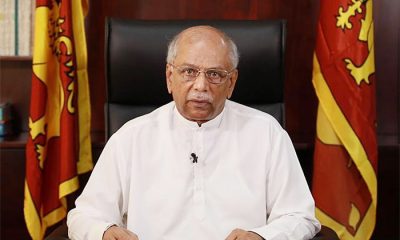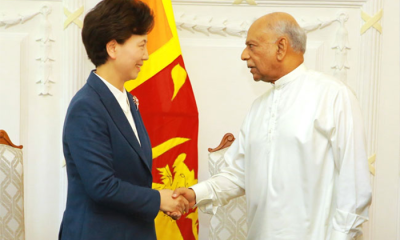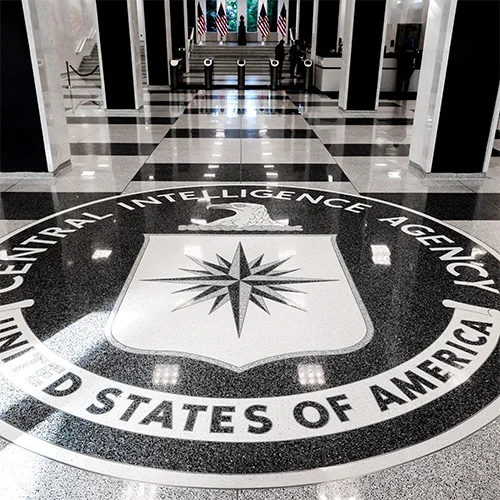Midweek Review
Sri Lanka’s foreign policy dilemma
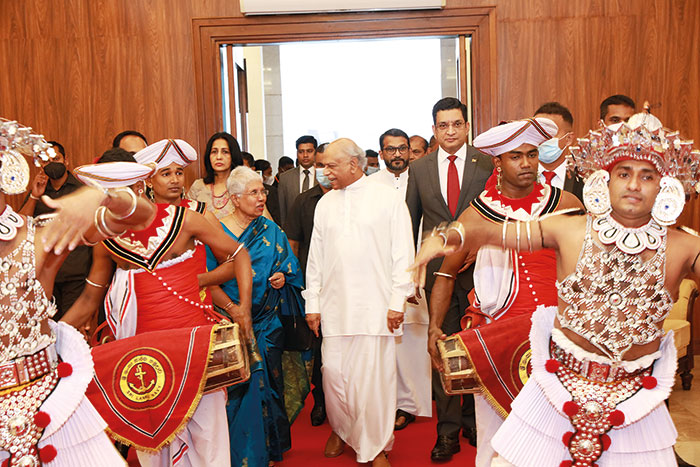
Bankrupt Sri Lanka is caught up in a China-US battle. The situation has been further complicated by India, Japan and Australia becoming part of the US-led military alliance meant to counter China. The US-led grouping is hell-bent on enhancing its influence in Colombo as both parties woo lawmakers. Recent declaration by the ruling party that the USD 2.9 bn IMF loan facility would be in jeopardy unless Parliament enacted the 21st Amendment to the Constitution is nothing but a severe warning to Parliament. Should Constitutional Amendments be subjected to foreign interference?
By Shamindra Ferdinando
Previous Canadian High Commissioner in Colombo, David McKinnon, in May this year, ridiculed the political party system here. Obviously referring to the rapidly developing political crisis in the wake of the unprecedented eruption of public anger at the then President Gotabaya Rajapaksa on March 31,
McKinnon tweeted: “Every day I am reminded that #SriLanka sets the gold standard for political humour. Maybe there’s a way to monetize this as an export? @TheDailyShow.” The Canadian sarcastically used the tag of the popular US political comedy “The Daily Show.”
McKinnon took over the Canadian mission here, in late Oct 2017, a couple of weeks after Ravi Karunanayake was forced to give up the Foreign Ministry portfolio, following shocking disclosures like him claiming that he didn’t know who was paying for the luxury penthouse he and his family were occupying, during the Presidential Commission of Inquiry that probed into Arjuna Mahendran affair (Central Bank Treasury Bond scams). McKinnon’s five-year term here ended in early Oct. this year. At the time McKinnon presented credentials on Oct. 23, 2017, Maithripala Sirisena served as the President.
We wonder what the Canadian would have to say about finding remains of native children in more than 2000 unmarked graves on the grounds of Church-run schools, in Canada, where they had been forcefully taken from their homes to learn white man’s “civilised” behaviour. Perhaps, some of those children would have been molested/raped by sex maniacs who were their state appointed guardians and killed to prevent the truth coming out. Canada/UNHRC where are the independent probes by international judges into such crimes committed.
Five years later, Sirisena returned to Parliament as an ordinary member whereas Ranil Wickremesinghe, who served as the Prime Minister at the time McKinnon arrived in Colombo, received the outgoing envoy at the Presidential Secretariat late last month.
It would be pertinent to mention that McKinnon chided political party system here three days after UNP National List MP Wickremesinghe received the appointment as the Premier. Beleaguered President Gotabaya Rajapaksa had no option but to invite Wickremesinghe in the wake of Samagi Jana Balavegaya (SJB) leader Sajith Premadasa turning down the invitation.
There had not been a previous instance of a foreign envoy making such derisive remarks publicly . As a member of the UK-led Sri Lanka Core Group at the Geneva-based United Nations Human Rights Council (UNHRC), Canada played quite an active role against Sri Lanka.
However, there is no point in finding fault with Canada for Sri Lanka’s continuing failure to set the record straight. The Foreign Ministry cannot absolve itself of the responsibility for Sri Lanka’s pathetic response to war crimes accusations. At the recently concluded 51 Geneva sessions, a section of the international community expanded the ‘charge sheet’ to include economic crimes.
Where are the modern day equivalents of the likes of Shirley Amarasinghe, Chris Pinto, Vernon Mendis, Izeth Hussain or even non-career, but highly talented longtime ambassador Neville Kanakaratne, to name a few, who could stand up to defend Lanka’s interests, being second to none in the world when called upon to do so. Minister Sabry serving as a one-man defence team, won’t do, unless the Foreign Service was fully geared to take up that task. We are certain there are very capable officers in our Foreign Service, even among those who got in with influence, and Minister Sabry must make it a point to nurture such talented officers and protect them from the cabal that calls the shots at the Ministry.
Foreign Minister Ali Sabry, PC, had to respond to the latest diatribe against the country and he rightly questioned the legitimacy of Geneva’s approach. Perhaps Sabry, hadn’t taken into consideration his own criticism of the government set up that caused the economic fallout. In June, this year, Sabry explained how those who had been responsible for overseeing the country’s finances ruined the national economy. The Minister identified them by positions held at that time (Dr. PBJ, Secretary to the President and longtime monetary honcho, Prof. W.D. Lakshman, Governor, Central Bank and economic guru, Ajith Nivaard Cabraal, Governor, Central Bank and S.R. Attygalle, Secretary to the Treasury.)
The economy has deteriorated to such an extent and the country trapped in a deepening political-economic-social crisis, the Wickremesinghe-Rajapaksa government seems in a catch-22 situation. Former MP and one-time Sri Lanka’s Ambassador in Tehran, M.M. Zuhair, PC, recently discussed the ongoing crises against the backdrop of Sri Lanka’s readiness to accept foreign help to probe the 2019 Easter Sunday carnage and continuing refusal to allow foreign investigations into alleged war crimes claimed to have been committed when the security forces crushed the hitherto considered invincible LTTE in the battle field against the advice of the West. The former Senior State Counsel addressed these issues taking into consideration the stand taken by Muslim majority nations at the UNHRC this year. Zuhair pointed out those Muslim majority nations refrained from supporting Sri Lanka for the first time at the UNHRC 51st sessions, Zuhair also warned that these countries were likely to vote against Sri Lanka at the next opportunity.
BIDTI event
Bandaranaike International Diplomatic Training Institute (BIDTI) recently held its 24th Convocation with the participation of Prime Minister Dinesh Gunawardena, who held the Foreign Affairs portfolio, under President Gotabaya Rajapaksa, and incumbent Foreign Minister Sabry, an SLPP National List MP. State Minister for Foreign Affairs Tharaka Balasuriya and Foreign Secretary Aruni Yasodha Wijewardena were among the invitees.
There had been two groups of students (2019/2020) and (2020/2021) at the 24th Convocation as the previous one was held in the second week of August 2019, in the run-up to the presidential election. The then Prime Minister Ranil Wickremesinghe had been the Chief Guest while Foreign Minister Tilak Marapana, PC, and Foreign Secretary Ravinatha Aryasinghe joined the UNP leader in presenting awards and certificates. the Foreign Minister is the Chairman of the Board of Management of the BIDTI.
Between the 23rd and 24th BIDTI Convocations, an utterly corrupt political party system has bankrupted the country. The economic crisis should be examined taking into consideration the political chaos caused by the disintegration of the recognized political party system. The parliamentary politics is now in such a confused and pathetic state, lawmakers, representing 15 political parties therein, are pulling in different directions. Of the 225-member Parliament, President Wickremesinghe’s UNP is represented by one
National List MP (Vajira Abeywardena) whereas Premier Gunawardena’s MEP group consists of three MPs (PM, Sisira Jayakody and PM’s son, Yadamini). Yadamini Gunawardena represents the SLPP National List. MEP contested the last general election on the SLPP ticket.
Maithripala Sirisena’s SLFP has been reduced to 14 MPs, and half of them have switched their allegiance to President Wickremesinghe.
Perhaps, the top management of the BIDTI should have invited the Governor of the Central Bank, Dr. Nandalal Weerasinghe, to educate those who received recognition at the 24th Convocation. The intrepid banker could have briefed them of the ground situation the way he told the Parliament, on August 31, how the political party system ruined the country.
If Sri Lanka is genuinely interested in developing a skilled Foreign Service, unwarranted political interferences must also be stopped forthwith. Political parties, represented in Parliament, should end the despicable practice of approving heads of missions. The High Posts Committee, headed by the Speaker, has become just a rubber stamp with those near and dear to the powers that be receiving ambassadorial posts as by birth right. The whole process, in spite of criticism by sections of the media, continued unabated over the years, with tacit understanding of the government and the Opposition.
The Foreign Service lacked the required strength to stand up to political machinations. There cannot be a better example than when Tamil National Alliance (TNA) heavyweight M.A. Sumanthiran declared, in Washington, a tripartite agreement among the US, Sri Lanka and the TNA regarding hybrid war crimes court in the presence of Sri Lanka’s Ambassador in Washington Prasad Kariyawasam.
That was in 2016. The top career diplomat returned to Colombo, the following year, to receive appointment as the Foreign Secretary. Following his retirement, Kariyawasam moved to Parliament as an Advisor to the then Speaker Karu Jayasuriya. Kariyawasam paid for by the USAID! The endowment shouldn’t have surprised anyone against the backdrop of Kariyawasam’s role in approving ACSA (Access and Cross Servicing Agreement) in early August 2017. The USAID enhanced its role here during the Yahapalana administration with the launch of a Rs 1.92 bn partnership (USD 13 mn) meant to strengthen accountability and democratic governance. It should be stressed that during the Yahapalana administration, Sri Lanka secured ISBs (International Sovereign Bonds) amounting to approximately USD 12.5 bn, one of the major causes of thr current economic crisis. As to what they did with that money is anybody’ s guess as they hardly undertook any major development projects, unlike the Rajapaksas’, whose hallmark was grandiose projects. May be future generations will judge Rajapaksas, particularly Mahinda and Gotabaya, differently like us now appreciating our ancestors for building the great tank civilization and cities like Anuradhapura, Polonnaruwa or even Sigiriya.
Even achievements of Field Marshal Sarath Fonseka, who can be easily called the type of general who only appears once in a couple of thousand years, as someone has said, have got negated because of his short fuse and short sighted politics.
The SJB has been largely silent on the issue at hand for obvious reasons. The JVP has repeatedly pointed out how the UNP-led Yahapalana government pursued an extremely risky economic strategy at that time. The UNP and its breakaway faction, now registered as SJB, definitely owed an explanation.
A daunting challenge
Sri Lanka should undertake a comprehensive study on the 2015 Geneva accountability resolution. The BIDTI can be part of the group assigned to embark on the study as Geneva steps up the offensive. Dinesh Gunawardena, in his capacity as the Foreign Minister, at the March 2020 Geneva sessions famously announced Sri Lanka’s decision to withdraw from the Geneva process.
Unfortunately, though much was expected from Prof G.L. Peiris, as the successor Foreign Minister, with his photographic memory, but hardly anything has changed at that Ministry during his tenure to clear up the mess there.
Sri Lanka’s Geneva statement was made a month after the US declared a travel ban on General Shavendra Silva, the then Commander of the Army and Acting Chief of Defence Staff (CDS).
Unfortunately, the Foreign Ministry, under different political leaderships, never sought to set the record straight. Instead, it allowed the further deterioration of the situation. On the basis of failing to challenge the unsubstantiated war crime allegations, yet to be verified in a court of law, Western powers have taken punitive measures against selected retired and serving officers, who are the true living heroes of this country. War-winning Army Chief Field Marshal Sarath Fonseka is among them. When the writer raised this issue with Foreign Minister Sabry, at a media briefing ahead of the Geneva sessions, the President’s Counsel stressed that the entire fighting Divisions have been categorized.
Tangible actions are necessary to have the accusations countered and the war-winning armed forces cleared of wrongdoing. Instead, successive governments quite conveniently allowed the situation to deteriorate. The British steadfastly refused to accept their own independent version of the Vanni military action, despite Lord Naseby disclosing in the House of Lords in Oct. 2017 the existence of such official records that effectively debunked war crimes allegations.
Sri Lanka never really pushed the British on this matter as the latter pursued a hostile campaign against Sri Lanka at the UNHRC. The UK’s rejection of their own diplomatic cables should be examined, taking into consideration similar US refusal to accept Colombo-based Defence Advisor Lt. Colonel Lawrence Smith’s public declaration in June 2011 that the Sri Lanka military didn’t perpetrate war crimes during the last phase of the offensive, to defeat the LTTE. In fact, the Foreign Ministry never really wanted to counter accusations in a systematic way. The Foreign and Defence Ministries never acted in unison as those responsible pursued their own agendas, much to the disappointment of the armed forces.
The case of Imaad Shah Zuberi, 50, revealed how the war-winning government outsourced Foreign Ministry responsibilities, possibly due to its known ineptness, to an American venture capitalist and political fundraiser who was sentenced on Feb 18, 2021 to 144 months in federal prison. U.S. District Judge Virginia A. Phillips found him guilty for fabricating records to conceal his work as a foreign agent while lobbying high-level U.S. government officials, evading the payment of millions of dollars in taxes, making illegal campaign contributions, and obstructing a federal investigation into the source of donations to a presidential inauguration committee.
Zuberi of Arcadia, California, was also ordered to pay $15,705,080 in restitution and a criminal fine of $1.75 million.
This criminal waste of funds took place during the tail end of Mahinda Rajapaksa’s second term. The payments were made by the Central Bank. Sri Lanka never bothered to examine this case. Who authorized the hiring of Zuberi?
Let me reproduce a relevant section of a statement issued by the US Department of Justice on Feb 18, 2021, that dealt with Zuberi’s case. It was titled ‘Political Donor Sentenced to 12 Years in Prison for Lobbying and Campaign Contribution Crimes, Tax Evasion, and Obstruction of Justice.’ The following is the section that dealt with Sri Lanka: “In addition, the government of Sri Lanka hired Zuberi in 2014 to rehabilitate the country’s image in the United States, which had suffered because of allegations that its minority Tamil population had been persecuted. Zuberi promised to make substantial expenditures on lobbying efforts, legal expenses, and media buys, which prompted Sri Lanka to agree to pay Zuberi a total of $8.5 million over the course of six months in 2014. Days after Sri Lanka made an initial payment of $3.5 million, Zuberi transferred $1.6 million into his personal brokerage accounts and used another $1.5 million to purchase real estate.
In total, Sri Lanka wired $6.5 million pursuant to the contract, and Zuberi used more than $5.65 million of that money to the benefit of himself and his wife. Zuberi paid less than $850,000 to lobbyists, public relations firms and law firms, and refused to pay certain subcontractors based on false claims that Sri Lanka had not provided sufficient funds to pay invoices.
Relatedly, Zuberi failed to report on his 2014 tax return millions of dollars in income he received from the Sri Lankan government. While his 2014 federal income tax return claimed income of $558,233, Zuberi failed to report more than $5.65 million he received in relation to the Sri Lanka lobbying effort. Zuberi’s tax evasion over the course of four years – 2012 through 2015 – caused tax losses ranging from $3.5 million to as much as $9.5 million.”
In a sense Mahinda Rajapaksa was like a drowning man facing the might of the West, led by the US and the UK, so they literally clutched at proverbial straws to escape drowning. They also trusted the wrong people, like Namal foolishly spending on a ‘nil balakaya’ thinking that would be his rallying force.
In the following year, at the behest of the US, the Yahapalana regime betrayed its armed forces at the UNHRC. The Geneva process is apparently still on track though Gotabaya Rajapaksa’s administration declared in 2020 that it withdrew from the 2015 UNHRC resolution.
The Rajapaksa administration never accepted responsibility for this criminal waste of money on foolish lobbying efforts. The then Central Bank Governor Ajith Nivard Cabraal denied his responsibility. The Parliament should have inquired into this matter. Alas, Parliament has pathetically failed not only in its primary responsibilities-ensuring financial discipline and enactment of laws but overall supervision of key sectors, including foreign affairs.
Against the backdrop of the US court verdict on Zuberi, Sri Lanka suffered another humiliation when a US court in July this year sentenced Sri Lanka’s former ambassador to Washington and Rajapalsa kinsman to a US$5,000 fine and two years’ probation.
Former President Mahinda Rajapaksa’s cousin Jaliya Chitran Wickramasuriya pleaded guilty to diverting and attempting to embezzle US$332,027 from the government of Sri Lanka, as it purchased a new embassy building in Washington in 2013.
“Even though this was not millions of dollars, it represents a serious theft from the people, and by a person that they entrusted to represent their interests in the capital of the most powerful country in the world,” said Judge Tanya S. Chutkan. “What you have done is a serious betrayal.”
Udayanga Weeratunga, another cousin of the ex-President, served as Sri Lanka’s ambassador in Moscow from 2006 to 2015. Standard restrictions that applied to other heads of missions didn’t apply to Wickramasuriya and Weeratunga because of their relationship with the Rajapaksas. Unfortunately, the Sri Lankan style in handling foreign affairs, whoever is in power hasn’t changed. The country has paid a huge price for hurting Japan and Russia over the abrupt cancellation of the Light Train Transit (LRT) Project in Sept. 2020 and detention of Aeroflot flight in June this year. The Yahapalana government (2015-2019) caused a major crisis by antagonizing China when it halted the Colombo Port City project and making unsubstantiated allegations pertaining to Chinese loans. The recent furore over Sri Lanka suddenly denying Chinese research vessel access to Hanbantota port after having earlier okayed it, controversy over Chinese organic fertiliser shipment that had to be settled by paying China USD 6.7 mn and official ‘interference’ in Indian liquid fertiliser purchases underscored the fragility in the systems in place.
Midweek Review
Aragalaya: GR blames CIA in Asanga Abeyagoonasekera’s explosive narrative
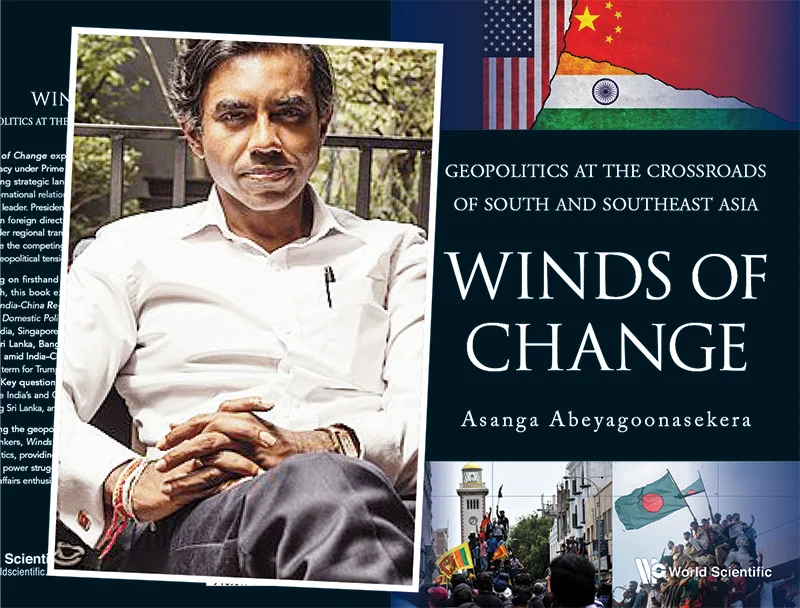
Did CIA chief William Burns visit Colombo in Feb 2023? Sri Lanka and the US refrained from formally confirming the visit. The Opposition sought confirmation of the then CIA Chief’s visit to Colombo in terms of the Right to Information Act but the Wickremesinghe-Rajapaksa government sidestepped the query. A former Republican congressman from Texas and Director of National Intelligence (2020–2021) John Ratcliffe succeeded Burns in late January 2025.
On the sheer weight of new evidence presented by Asanga Abeyagoonasekera’s ‘Winds of Change’, readers can get a clear picture of the forces that overthrew President Gotabaya Rajapaksa in 2022.
Even five years after the political upheaval, widely dubbed ‘Aragalaya,’ controversy surrounds the high-profile operation that forced wartime Defence Secretary Gotabaya Rajapaksa to literally run for his dear life.
Gotabaya Rajapaksa, formerly of the Army but a novice to party politics, comfortably won the 2019 November presidential election against the backdrop of the Easter Sunday carnage that caused uncertainty and suspicions among communities. The economic crisis, also clandestinely engineered from abroad, firstly by crippling vital worker remittances from abroad, almost from the onset of Gotabaya Rajapaksa’s presidency, overwhelmed the government and created the environment conducive for external intervention. Could it have been avoided if the government, that enjoyed a near two-thirds majority in Parliament, sought the help of the International Monetary Fund (IMF)?
The costly and well-funded book project, undertaken at the time Abeyagoonasekera was working on a governance diagnostic report for the IMF, in the wake of the change of government in Sri Lanka, meticulously examined the former Lieutenant Colonel’s ouster, taking into consideration regional as well as global developments. Abeyagoonasekera dealt efficiently and furiously with rapidly changing situations and developments before the unprecedented 03 January, 2026, US raid on Venezuela.
Lt. Col. (retd) Gotabaya Rajapaksa, for some unexplainable reason and a considerable time after the events, has chosen to blame his ouster on the United States. We cannot blame him either, by the way we have seen how other regime changes had been engineered, in our region, by Washington, since and before Gotabaya’s ouster. The accusation is extraordinary as Gotabaya Rajapaksa in his memoirs ‘The conspiracy to oust me from presidency’ refrained from naming the primary conspirator, though he clearly alluded to an international conspiracy.
April 8, 2019 meeting
Launched in March 2024, in the run-up to the presidential election that brought Anura Kumara Dissanayake (AKD) to power, almost in a dream ride, if not for the intervening outside evil actors, ‘The conspiracy to oust me from presidency’ discussed the international conspiracy, but conveniently failed to name the primary conspirator. What made the former President speak so candidly with Abeyagoonasekera, the founding Director-General of the national security think tank, the Institute of National Security Studies Sri Lanka (INSS), under the Ministry of Defence, from 2016 to 2020?
Abeyagoonasekera also served as Executive Director at the Lakshman Kadirgamar Institute (LKI), under the Ministry of Foreign Affairs (2011–2015), during Mahinda Rajapaksa’s second term as the President. The author, both precisely and furiously, dealt with issues. Readers may find very interesting quotes and they do give a feeling of the author’s general hostility towards the US, India, as well as to the US-India marriage of convenience. Those who sense so may end up thinking ‘Change of Winds’ being supportive of the Chinese strategy. Among the highly sensitive quotes that underlined the Indian approach were attributed to Indian Defence Secretary Sanjay Mitra. The author quoted Mitra as having declared: “We need the MRCC centre [Maritime Rescue Coordination Centre], and you cannot give it to another nation.” As pointed out by the author, it was not a request but an order given to Sri Lanka on 8 April, 2019, meant to prevent Sri Lanka from even considering a competing proposal from China. Against that background, the author, who had been present at that meeting at which the Sri Lanka delegation was led by then Defence Secretary Hemasiri Fernando, questioned the failure on the part of the delegations to take up the Easter Sunday attacks. Terrorists struck two weeks later. Implications were telling.
That particular quote reveals the circumstances India and the US operated here. No wonder the incumbent government does not want to discuss the secret defence MoUs it has entered into with India and the US as they would clearly reveal the sellout of our interests.
The following line says a lot about the circumstances under which Gotabaya Rajapaksa was removed: “In Singapore, a senior journalist recounted how Gotabaya Rajapaksa’s resignation was scripted, under duress, at a hotel, facilitated by a foreign motorcade.”
In the first Chapter that incisively dealt with the Belt and Road Initiative (BRI), the author was so lucky to secure an explosive quote from the ousted leader in an exclusive, hitherto unreported, interview in June 2024, a few months after the launch of Gotabaya Rajapaksa’s memoirs. The ex-President hadn’t minced his words when he alleged that the Central Intelligence Agency (CIA) orchestrated his removal. He also claimed that he had been under US surveillance throughout his presidency.
The ousted leader has confidently cleared India’s Research and Analysis Wing (RAW) of complicity in the operation. What made him call Indian National Security Advisor (NSA) Ajit Doval ‘a good man,’ in response to Abeyagoonasekera’s pointed query. Abeyagoonasekera quoted Gotabaya Rajapaksa as having said: “… he would never do such things.” The ex-President must have some reason to call Doval a good friend, regardless of intense pressure exerted on him and the Mahinda Rajapaksa government by the Indians to do away with large scale Chinese-funded projects. (Doval in late October last year declared “poor governance” was the reason behind uprisings that led to change of governments in Bangladesh, Nepal, and Sri Lanka over the period of past three-and-a-half years. The media quoted Doval as having said, during a function in New Delhi, that democracy and non-institutional methods of regime change in countries, such as Bangladesh, Sri Lanka and Nepal, created their own set of problems. That was the first time a senior Indian government official made remarks on Nepal’s government change, followed by the Gen Z uprising in early September, 2025.)
Gotabaya Rajapaksa also cleared the Chinese of seeking to oust him. It would be pertinent to mention that China reacted sternly when at the onset of the Gotabaya presidency, the President suggested the need to re-negotiate the Hambantota Port deal.
During the treacherous ‘Yahapalana’ administration (2015 to 2019) Gotabaya Rajapaksa told me how Doval had pressed him to halt not only the Colombo Port City project but to take back Hambantota Port as well. By then, the Chinese had twisted the arms of the Yahapalana leaders Mairthpala Sirisena and Ranil Wickremesinghe and secured the Hambantota Port on a 99-year lease in a one-sided USD 1.2 bn deal. The Colombo Port City project, that had been halted by the Yahapalana government, too, was resumed possibly under Chinese threat or for some money incentive.
Once Wijeyadasa Rajapakshe, PC, declared, at a hastily arranged media briefing at Sri Lanka Foundation (SLF), that Sri Lanka would be relentlessly targeted as long as the Chinese held the Hambantota Port. The writer was present at that media briefing.
Wijeyadasa Rajapakshe said so in the aftermath of the 2019 Easter Sunday carnage, while disclosing his abortive bid to convince the Yahapalana government to abrogate the Hambantota Port deal. Did the parliamentarian know something we were not aware of? The author’s assessment, regarding the Easter Sunday attacks, based on interviews with Chinese officials and scholars, is frightening and an acknowledgement of a possible Western role in Sri Lanka’s destabilisation plot.
The ousted leader, in his lengthy interview with Abeyagoonasekera, made some attention-grabbing comments on the then US Ambassador here, Julie Chung. The ex-President questioned a particular aspect of Chung’s conduct during the protest campaign but his decision not to reveal it all in his memoirs is a mystery. Perhaps, one of the most thought-provoking queries raised by Abeyagoonasekera is the rationale in Gotabaya Rajapaksa’s claim that he didn’t want to suppress the protest campaign by using force against the backdrop of his own declaration that the CIA orchestrated the project.
Author’s foray into parliamentary politics
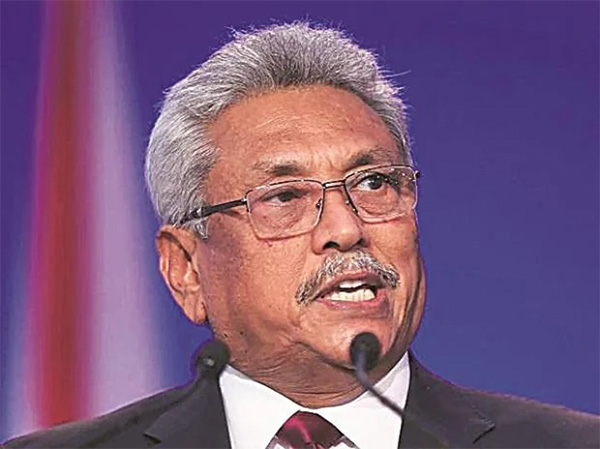
Gotabaya
For those genuinely interested in post-Chandrika Bandaranaike Kumaratunga developments, pertaining to international relations and geopolitics, may peruse ‘Winds of Change’ as the third of a trilogy. ‘Sri Lanka at Crossroads’ (2019) dealt with the Mahinda Rajapaksa period and ‘Conundrum of an Island’ (2021) discussed the treacherous Sirisena–Wickremesinghe alliance. The third in the series examined the end of the Sri Lanka Podujana Peramuna’s (SLPP) President Gotabaya Rajapaksa’s rule and the rise of Anura Kumara Dissanayake (AKD) whom the author described as a Marxist, though this writer is of the view the JVP and NPP leader AKD is not so. AKD has clearly aligned his administration with US-India while trying to sustain existing relationship with China.
Among Asanga Abeyagoonasekera’s other books were ‘Towards a Better World Order’ (2015) and ‘Teardrop Diplomacy: China’s Sri Lanka Foray’ (2023, Bloomsbury).
Had Abeyagoonasekera succeeded in his bid to launch a political career in 2015, the trilogy on Sri Lanka may not have materialised. Abeyagoonasekera contested the Gampaha district at the August 2015 parliamentary election on the UNP ticket but failed to garner sufficient preferences to secure a place in Parliament. That dealt a devastating setback to Abeyagoonasekera’s political ambitions, but the Wickremesinghe-Sirisena administration created the Institute of National Security Studies Sri Lanka (INSS), under the Ministry of Defence, for him. Abeyagoonasekera received the appointment as the founding Director-General of the national security think tank, from 2016 to 2020.
Several persons dealt with ‘Aragalaya’ (the late Prof. Nalin de Silva used to call it (Paragalaya) before Abeyagoonasekera though none of them examined the regional and global contexts so deeply, taking into consideration the relevant developments. Having read Wimal Weerawansa’s (Nine: The hidden story), Sena Thoradeniya’s (Galle Face Protest; Systems Change or Anarchy?). Mahinda Siriwardena’s (Sri Lanka’s Economic Revival – Reflection on the Journey from Crisis to Recovery) and Prof. Sunanda Maddumabandara’s (Aragalaye Balaya), the writer is of the opinion Abeyagoonasekera dealt with the period in question as an incisive insider.
Abeyagoonasekera, as a person who left the country, under duress, in 2021, painted a frightening picture of a country with a small and vulnerable economy trapped in major global rivalries. The former government servant attributed his self–imposed exile to two issues.
The first was the 2019 Easter Sunday carnage. Why did the Wickremesinghe-Sirisena government ignore the warning issued by Abeyagoonasekera, in his capacity as DG INSS, in respect of the Easter Sunday bombing campaign? There is absolutely no ambiguity at all in his claim. Abeyagoonasekera insists that he alerted the government four months before the National Thowheed Jamath (NTJ) bombers struck. The bottom line is that Abeyagoonasekera had issued the warning several weeks before India did but those at the helm of that inept administration chose to turn a blind eye.
The second was the impending economic crisis that engulfed the country in 2022. Abeyagoonasekera is deeply bitter about his arrest on 21 July, 2024, at the Bandaranaike International Airport (BIA) over an alleged IRD –related offence as reported at that time, especially because he was returning home to visit his sick mother.
Asanga’s father Ossie, a member of Parliament and controversial figure, was killed in an LTTE suicide attack at Thotalanga in late Oct. 1994. The Chairman and leader of Sri Lanka Mahajana Pakshaya had been on stage with then UNP presidential election candidate Gamini Dissanayake when the woman suicide cadre blasted herself. The assassination was meant to ensure Kumaratunga’s victory. The LTTE probably felt that it could manipulate Kumaratunga than the experienced Dissanayake who may have had reached some sort of consensus with New Delhi on how to deal with the LTTE.
Let me reproduce a question posed to Asanga Abeyagoonasekera and his response in ‘Winds of Change’ as some may believe that the author is holding something back. “Didn’t they listen?” a US intelligence officer had asked me incredulously after the bombings. Years later, during my role as a technical advisor for the International Monetary Fund (IMF) amid Sri Lanka’s collapse, the question resurfaced: “How did you foresee the collapse of a powerful regime with a majority in parliament?” My answer remained the same—patterns. Rigorously gathered data and relentless analysis reveal the arcs of history before they unfold.
Perhaps, readers may find what former cashiered Flying Officer Keerthi Ratnayake had to say about ‘Aragalaya’ and related developments (https://island.lk/ex-slaf-officer-sheds-light-on-developments-leading-to-aragalaya/)
Bombshell claim
Essentially, Abeyagoonasekera, on the basis of his exclusive and lengthy interview with former President Gotabaya Rajapaksa, confirmed what Wimal Weerawansa and Sena Thoradeniya alleged that the US spearheaded the operation.
But Prof. Maddumabandara, a confidant of first post-Aragalaya President Ranil Wickremesinghe has bared the direct Indian involvement in the regime change operation. In spite of Gotabaya Rajapaksa confidently clearing Indian NSA Doval of complicity in his ouster, Prof. Maddumabandara is on record as having said that the then Indian High Commissioner here Gopal Baglay put pressure on Speaker Mahinda Yapa Abeywardena to take over the government for an interim period. (https://island.lk/dovals-questionable-regional-stock-taking/)
Obviously, the US and India worked together on the Sri Lanka regime change operation. That is the undeniable truth. India wanted to thwart Wickremesinghe receiving the presidency by bringing in Speaker Abeywardena. That move went awry in spite of some sections of both Buddhist and Catholic clergy throwing their weight behind New Delhi.
The 2022 violent regime change operation cannot be discussed without taking into consideration the US-led project that also involved the UNP, JVP and TNA to engineer retired General Sarath Fonseka’s victory at the 2010 presidential election and their backing for turncoat Maithripala Sirisena at the 2015 presidential election.
The section, titled ‘Echoes of Crisis from Sri Lanka to Bangladesh: South Asia’s Struggle in a Polycrisis’, is riveting and underscores the complexity of the situation and fragility of governments. Executive power and undisputable majorities in Parliament seems irrelevant as external powers intervene thereby making the electoral system redundant.
Having meticulously compared the overthrowing of Gotabaya Rajapaksa and Bangladesh’s Premier Sheikh Hasina, the author condemned them for their alleged failures and brutality. Abeyagoonasekera stated: “When the military sides with the protesters, as it did in Sri Lanka and now in Bangladesh, it reveals the rulers’ vulnerabilities.” The author unmercifully chided the former President for seeking refuge in the West while alleging direct CIA role in his ouster. But that may have spared his life. Had he sought a lifeline from the Chinese so late the situation could have taken a turn for worse.
The comment that had been attributed to Gotabaya Rajapaksa seemed to belittle Ranil Wickremesinghe who accepted the challenge of becoming the Premier in May 2022 and then chosen by the ruling SLPP to complete the remainder of Gotabaya Rajapaksa’s five-year term. Ranil was definitely seen as an opportunistic vulture who backed ‘Aragalaya’ without any qualms till he saw an opening for himself out of the chaos.
On Wickremesinghe’s path
Abeyagoonasekera discussed the joint US-Indian strategy pertaining to Sri Lanka. Whatever the National People’s Power (NPP) and its President say, the current dispensation is continuing Wickremesinghe’s policy as pointed out by the author. In fact, this government appears to be ready even to go beyond Wickremesinghe’s understanding with New Delhi. The Memorandum of Understanding (MoU) on defence and the selling of the controlling interests of the Colombo Dockyard Limited (CDL) to India, mid last year, must have surprised even those who always pushed for enhanced relations at all levels.
The economic collapse that resulted in political upheaval has given New Delhi the perfect opportunity to consolidate its position here. Uncomplimentary comments on current Indian High Commissioner Santosh Jha in ‘Winds of Change’ have to be discussed, paying attention to Sri Lanka’s growing dependence and alleged clandestine activities of India’s Research and Analysis Wing (RAW). Abeyagoonasekera seemed to have no qualms in referring to RAW’s hand in 2019 Easter Sunday carnage.
Overall ‘Winds of Change’ encourages, inspires and confirms suspicions about US and Indian intelligence services and underscores the responsibility of those in power to be extra cautious. But, in the case of smaller and weaker economies, such as Sri Lanka still struggling to overcome the economic crisis, there seems to be no solution. Not only India and the US, the Chinese, too, pursue their agenda here unimpeded. Utilisation of political parties, represented in Parliament, selected individuals, and media, in the Chinese efforts, are obvious. Once parliamentarian Wijeyadasa Rajapakshe raised the Chinese interventions in Sri Lanka. He questioned the Parliament receiving about 240 personal laptops for all parliamentarians and top officials. The then UNPer told the writer his decision not to accept the laptop paid for by China. Perhaps, he is the only Sri Lankan politician to have written a strongly worded letter to Chinese leader Xi warning against high profile Chinese strategy.
Winds of Change
is available at
Vijitha Yapa and Sarasavi
By Shamindra Ferdinando
Midweek Review
Beginning of another ‘White Supremacist’ World Order?

 Donald Trump’s complete lack of intelligence, empathy and common sense have become more apparent during the current term of his presidency. Ordinarily, a country’s wish to self-destruct as the United States seemingly does at present, and as the violence against US citizens and immigrants alike at the hands of federal authorities have shown in Minnesota, can be callously considered the business of that country. If the Trumpian imbecility was unfolding in Sri Lanka, anywhere else in South Asia or some other country of the purported Third World, the so-called World Order, led by the United States, would be preaching to us the values of democracy and human rights. But what happens when the actions of a powerful country, such as the United States, engulfs in the ensuing flames the rest of us? Trump and his madness then necessarily become our business, too, because combined with the military and economic power of the United States and its government’s proven lack of empathy for its own people, and the rest of the world, is quite literally a matter of global survival. Besides, one of the ‘positive’ outcomes of the Trumpian madness, as a friend observed recently, is that “he has single-handedly exposed and destroyed the fiction of ‘Western Civilisation’, including the pretenses of Europe.”
Donald Trump’s complete lack of intelligence, empathy and common sense have become more apparent during the current term of his presidency. Ordinarily, a country’s wish to self-destruct as the United States seemingly does at present, and as the violence against US citizens and immigrants alike at the hands of federal authorities have shown in Minnesota, can be callously considered the business of that country. If the Trumpian imbecility was unfolding in Sri Lanka, anywhere else in South Asia or some other country of the purported Third World, the so-called World Order, led by the United States, would be preaching to us the values of democracy and human rights. But what happens when the actions of a powerful country, such as the United States, engulfs in the ensuing flames the rest of us? Trump and his madness then necessarily become our business, too, because combined with the military and economic power of the United States and its government’s proven lack of empathy for its own people, and the rest of the world, is quite literally a matter of global survival. Besides, one of the ‘positive’ outcomes of the Trumpian madness, as a friend observed recently, is that “he has single-handedly exposed and destroyed the fiction of ‘Western Civilisation’, including the pretenses of Europe.”
It is in this context that the speech delivered by the Canadian Prime Minister, Mark Carney, at the World Economic Forum, in Davos, on 20 January, 2026, deserves attention. It was an elegant speech, a slap in the face of Trump and his policies, the articulation of the need for global directional change, all in one. But, pertinently, it was also a speech that did not clearly accept responsibility for the current world (dis)order which Carney says needs to change. The reality of that need, however, was overly reemphasised by Trump himself during his meandering, arrogant and incohesive speech delivered a day later, spanning over one hour.
My interest is in what Carney did not specifically say in his speech: who would constitute the new world order, who would be its leaders and why should we believe it would be any different from the present one?
Speaking in French, Carney observed that he was talking about “a rupture in the world order, the end of a pleasant fiction and the beginning of a harsh reality, where geopolitics, where the large, main power, geopolitics, is submitted to no limits, no constraints.” He was, of course, responding to the vulgar script for global domination put in place by the Trumpian United States, given Trump’s declared interest in seeing Canada as part of the United States, his avarice for Greenland, not to mention his already concluded grab for Venezuelan oil. But within this scenario, bound by ‘no limits’ and ‘no constraints’ he was also talking of Russia and China albeit in a coded language.
He reiterated, “that the other countries, especially intermediate powers like Canada, are not powerless. They have the capacity to build a new order that encompasses our values, such as respect for human rights, sustainable development, solidarity, sovereignty and territorial integrity of the various states. The power of the less power starts with honesty.”
Who could disagree with Carney? His words are a refreshing whiff of fresh air in the intellectual wasteland that is the Trumpian Oval Office and the current world order it prevails over. But where has been the ‘honesty’ of the less powerful in the specific situation where he equates Canada itself within this spectrum? He tells us that “the rules-based order is fading, that the strong can do what they can, and the weak must suffer what they must.”
That is stating the obvious. We have known this for decades by experience. Long before Canada’s relative silence with regard to Trump’s and US’ facilitation of the assault on Palestine and the massacre of its people, and the US President’s economic grab in Venezuela and the kidnapping of that country’s President and his wife, Canada’s own chorus in the world order that Carney now critiques has been embellished by silence or – even worse – by chords written by the global dominance orchestra of the United States.
He says the fading of the rules-based order has occurred because of the “strong tendency for countries to go along, to get along, to accommodate, to avoid trouble, to hope that compliance will buy safety.” Canada fits this description better than most other nations I can think of. But would Canada, along with other nations among the silent majority within the ‘intermediate powers’ take the responsibility for the mess in the world precisely that silence has directly led to creating? Who will pay for the pain many nations have endured in the prevailing world order? Will Canada lead the way in the new world order in doing this?
Carney further articulates that “for decades, countries like Canada prospered under what we called the rules-based international order. We joined its institutions, we praised its principles, we benefited from its predictability. And because of that, we could pursue values-based foreign policies under its protection.”
But this is not true, is it? Countries like Canada prospered not merely because of the stability of rules of the world order, but because they opted for silence when they should not have. The rupture and the chaos in the world order Carney now critiques and is insanely led by Trump today is not merely the latter’s creation. It has been co-authored for decades by countries such as Canada, France, the United Kingdom to mention just a few who also regularly chant the twin-mantras of human rights and democracy. Trump is merely the latest and the most vocal proponent of the nastiness of that World Order.
It is not that Carney is unaware of this unpleasant reality. He accepts that “the story of the international rules-based order was partially false, that the strongest would exempt themselves when convenient, that trade rules were enforced asymmetrically. And we knew that international law applied with varying rigour depending on the identity of the accused or the victim.”
While Canada seems to be coming to terms with this reality only now, countries like Sri Lanka and others in similarly disempowered positions in this world order have experienced this for decades, because, as I have outlined earlier, Canada et al have been complicit sustainers of the now demonised and demonic world order.
It is not that I disagree with the basic description Carney has painted of the status of the world. But from personal experience and from the perspective of a citizen from a powerless country, I simply do not trust those who preach ‘the gospel of the good’ not as a matter of principle, but only when the going gets tough for them.
At this rather late stage, Carney says, Canada is “amongst the first to hear the wake-up call, leading us to fundamentally shift our strategic posture.” Unfortunately, we, the people of countries who had to dance to the tunes of the world order led by the First World, have heard it for years, with no one listening to us when our discomforts were articulated. Now, Carney wants ‘middle powers’ or ‘intermediate powers’ within which he also locates Canada, “to live the truth?” For him, the truth means “naming reality” as it exists; “acting consistently” towards all in the world; “applying the same standards to allies and rivals” and “building what we claim to believe in, rather than waiting for the old order to be restored.” This appears to be the operational mantra for the new world order he is envisioning in which he sees Canada as a legitimate leader merely due to its late wakeup call.
He goes on to give a list of things Canada has done locally and globally and concludes by saying, “we have a recognition of what’s happening and a determination to act accordingly. We understand that this rupture calls for more than adaptation. It calls for honesty about the world as it is.” He goes on to say Canada also has “the capacity to stop pretending, to name reality, to build our strength at home and to act together.” He notes this is “Canada’s path. We choose it openly and confidently, and it is a path wide open to any country willing to take it with us.” Quite simply, this a leadership pitch for a new world order with Canada at its helm.
Without being overly cynical, this sounds very familiar, not too dissimilar to what USAID and Voice of America preached to the world; not too dissimilar to what the propaganda arms of the Soviet Union and the Chinese Communist Party used to preach in our own languages when we were growing up. It is difficult to buy this argument and accept Canadian and middle country leadership for the new world order when they have been consistently part of the problem of the old one and its excuses for institutionalised double standards practiced by international organisations such as the likes of the United Nations, the World Bank, the International Monetary Fund and other hegemonic entities that have catered to the whims of that world order.
As far as Canada is concerned, it is evident that it has suddenly woken up only due to an existential threat at home projected from across its southern border and Trump’s threats against the Danish territory of Greenland. When Gaza was battered, and Venezuela was raped, there was no audible clarion call. Therefore, there is no real desire for democracy or human rights in its true form, but a convenient and strategic interest in creating a new ‘white supremacist’ world order in the same persona as before, but this time led by a new white warrior instead. The rest of us would be mere followers, nodding our heads as expected as was the case before.
As the 20th century American standup comedian Lenny Bruce once said, “never trust a preacher with more than two suits.” Mr. Carney, Canada along with the so-called middle powers and the lapsed colonialists have way more than two suits, and we have seen them all.
Midweek Review
The MAD Spectre
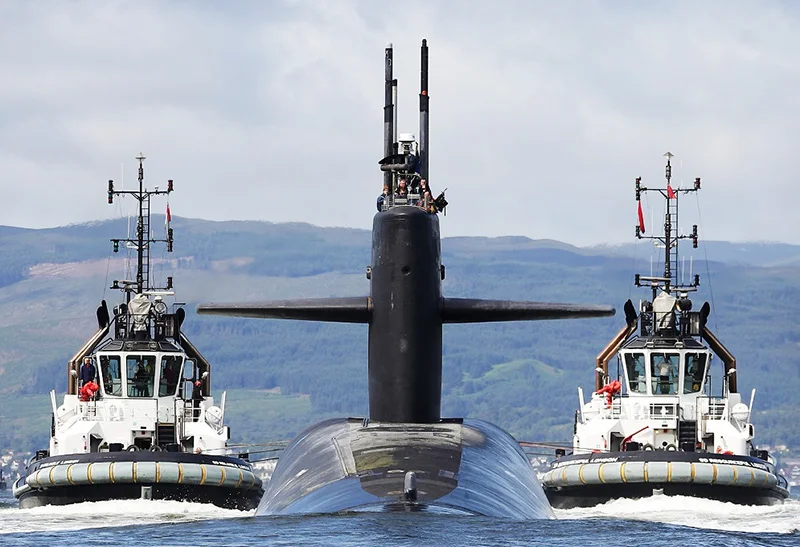
Lo and behold the dangerous doings,
Of our most rational of animals,
Said to be the pride of the natural order,
Who stands on its head Perennial Wisdom,
Preached by the likes of Plato and Confucius,
Now vexing the earth and international waters,
With nuke-armed subs and other lethal weapons,
But giving fresh life to the Balance of Terror,
And the spectre of Mutually Assured Destruction.
By Lynn Ockersz
-

 Business5 days ago
Business5 days agoSLIM-Kantar People’s Awards 2026 to recognise Sri Lanka’s most trusted brands and personalities
-

 Business23 hours ago
Business23 hours agoZone24x7 enters 2026 with strong momentum, reinforcing its role as an enterprise AI and automation partner
-

 Business7 days ago
Business7 days agoAltair issues over 100+ title deeds post ownership change
-

 Business7 days ago
Business7 days agoSri Lanka opens first country pavilion at London exhibition
-

 Business6 days ago
Business6 days agoAll set for Global Synergy Awards 2026 at Waters Edge
-
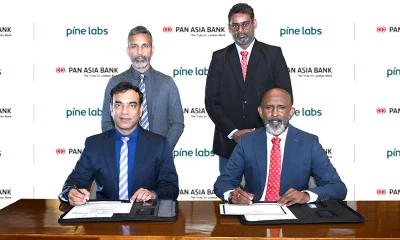
 Business5 days ago
Business5 days agoAPI-first card issuing and processing platform for Pan Asia Bank
-

 Business23 hours ago
Business23 hours agoHNB recognized among Top 10 Best Employers of 2025 at the EFC National Best Employer Awards
-
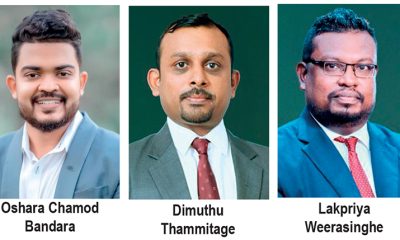
 Business7 days ago
Business7 days agoESOFT UNI Kandy leads the charge in promoting rugby among private universities


